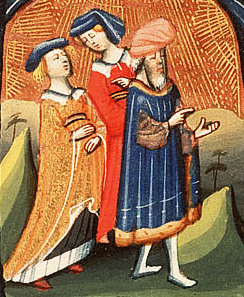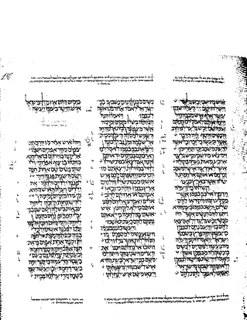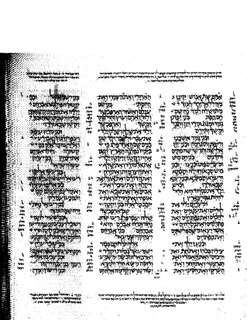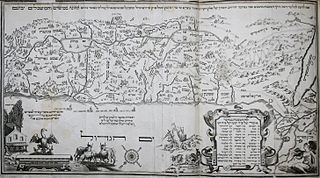
According to Abrahamic religions, Aaron was a prophet, a high priest, and the elder brother of Moses. Knowledge of Aaron, along with his brother Moses, exclusively comes from religious texts, such as the Bible and the Quran.

The book of Numbers is the fourth book of the Hebrew Bible, and the fourth of five books of the Jewish Torah. The book has a long and complex history; its final form is possibly due to a Priestly redaction of a Yahwistic source made some time in the early Persian period. The name of the book comes from the two censuses taken of the Israelites.

Samuel is a figure who, in the narratives of the Hebrew Bible, plays a key role in the transition from the biblical judges to the United Kingdom of Israel under Saul, and again in the monarchy's transition from Saul to David. He is venerated as a prophet in Judaism, Christianity, and Islam. In addition to his role in the Hebrew scriptures, Samuel is mentioned in Jewish rabbinical literature, in the Christian New Testament, and in the second chapter of the Quran. He is also treated in the fifth through seventh books of Antiquities of the Jews, written by the Jewish scholar Josephus in the first century. He is first called "the Seer" in 1 Samuel 9:9.
Amariah means "promised by God" in Hebrew. It was commonly used as a name of priests in the History of ancient Israel and Judah. It appear several times in the Hebrew Bible:
- One of the descendants of Aaron by Eleazar. He was probably the last of the high priests of Eleazar's line prior to the transfer of that office to Eli, of the line of Ithamar.
- A Levite, son of Hebron, of the lineage of Moses.
- A "chief priest" who took an active part in the reformation under Jehoshaphat ; probably the same as mentioned in 1 Chronicles 6:9.
- An ancestor of Ezra.
- One of the high priests in the time of Hezekiah.
- Great-grandfather of Zephaniah.
- Great-grandfather of Athaiah.
- One of the persons who sealed the covenant.
- One of the persons who had taken 'strange wives'.
Obed-Edom is a biblical name which in Hebrew means "servant of Edom," and which appears in the books of 2 Samuel and 1 and 2 Chronicles. The relationship between these passages has been the subject of scholarly discussions which express uncertainty and disagreements about the relationships between various passages that use the name.

Korah, son of Izhar, is an individual who appears in the Book of Numbers of the Hebrew Bible and four different verses in the Quran, known for leading a rebellion against Moses. Some older English translations, as well as the Douay–Rheims Bible, spell the name Core, and many Eastern European translations have Korak.

Zuph meaning honeycomb in Hebrew

Eli was, according to the Books of Samuel, a high priest of the Israelites in the city of Shiloh, ancient Israel. When Hannah came to Shiloh to pray for a son, Eli initially accused her of drunkenness, but when she protested her innocence, Eli wished her well. Hannah's eventual child, Samuel, was raised by Eli in the tabernacle. When Eli failed to rein in the abusive behavior of his sons, God promised to punish his family, which resulted in the death of Eli and his sons. Later biblical passages mention the fortunes of several of his descendants, and he figures prominently in Samaritan religious tradition.

Bemidbar, BeMidbar, B'midbar, Bamidbar, or Bamidbor, is the 34th weekly Torah portion in the annual Jewish cycle of Torah reading and the first in the Book of Numbers. The parashah tells of the census and the priests' duties. It constitutes Numbers 1:1–4:20. The parashah is made up of 7,393 Hebrew letters, 1,823 Hebrew words, 159 verses, and 263 lines in a Torah Scroll. Jews generally read it in May or early June.

Korach or Korah is the 38th weekly Torah portion in the annual Jewish cycle of Torah reading and the fifth in the Book of Numbers. It tells of Korah's failed attempt to overthrow Moses.

Elkanah was, according to the First Book of Samuel, the husband of Hannah, and the father of her children including her first, Samuel. Elkanah practiced polygamy; his other wife, less favoured but bearing more children, was named Peninnah. The names of Elkanah's other children apart from Samuel are not given. Elkanah plays only a minor role in the narrative, and is mostly a supporting character to Eli, Hannah, and Samuel.
Jeroham is a name which means "cherished" or "one who finds mercy". A number of people with this name are mentioned in the Hebrew Bible:
- The Father of Elkanah, and grandfather of the prophet Samuel — in 1 Samuel 1:1.
- The father of Azareel, the "captain" of the tribe of Dan — in 1 Chronicles 27:22.
- A Benjamite mentioned in 1 Chronicles 12:7 and 1 Chronicles 9:12.
- The father of Azariah, one of the "commanders of the hundreds" who formed part of Jehoiada's campaign to restore the kingship to Joash in 2 Chronicles 23:1
- A priest mentioned in 1 Chronicles 9:12;.
Ramah was, according to the Hebrew Bible, a city in ancient Israel in the land allocated to the tribe of Benjamin. It was located near Gibeon and Mizpah to the West, Gibeah to the South, and Geba to the East. It has been identified with modern Er-Ram, about 8 kilometres (5.0 mi) north of Jerusalem.

1 Samuel 1 is the first chapter of the First Book of Samuel in the Old Testament of the Christian Bible or the first part of the Books of Samuel in the Hebrew Bible. According to Jewish tradition the book was attributed to the prophet Samuel, with additions by the prophets Gad and Nathan, but modern scholars view it as a composition of a number of independent texts of various ages from c. 630–540 BCE. This chapter focuses on the birth of Samuel, in a section concerning the life of Samuel.

1 Chronicles 9 is the ninth chapter of the Books of Chronicles in the Hebrew Bible or the First Book of Chronicles in the Old Testament of the Christian Bible. The book is compiled from older sources by an unknown person or group, designated by modern scholars as "the Chronicler", and had the final shape established in late fifth or fourth century BCE. This chapter contains list of Jerusalem's inhabitants in the post-exilic period, and closes with the family of Saul, an almost literal repetition of the list of in 1 Chronicles 8:29–38. The first part of the chapter belongs to the section focusing on the list of genealogies from Adam to the lists of the people returning from exile in Babylon, whereas the second part belongs to the section focusing on the kingship of David.

1 Chronicles 23 is the twenty-third chapter of the Books of Chronicles in the Hebrew Bible or the First Book of Chronicles in the Old Testament of the Christian Bible. The book is compiled from older sources by an unknown person or group, designated by modern scholars as "the Chronicler", and had the final shape established in late fifth or fourth century BCE. This chapter records the divisions and duties of the Levites. The whole chapter belongs to the section focusing on the kingship of David, which from chapter 22 to the end does not have parallel in 2 Samuel.

1 Chronicles 26 is the twenty-sixth chapter of the Books of Chronicles in the Hebrew Bible or the First Book of Chronicles in the Old Testament of the Christian Bible. The book is compiled from older sources by an unknown person or group, designated by modern scholars as "the Chronicler", and had the final shape established in late fifth or fourth century BCE. This chapter describes particular duties of the Levites as gatekeepers, the temple treasurers, officers and judges. The whole chapter belongs to the section focusing on the kingship of David, which from chapter 22 to the end does not have parallel in 2 Samuel.

According to the Bible, the Tribe of Levi is one of the tribes of Israel, traditionally descended from Levi, son of Jacob. The descendants of Aaron, who was the first kohen gadol of Israel, were designated as the priestly class, the Kohanim.












